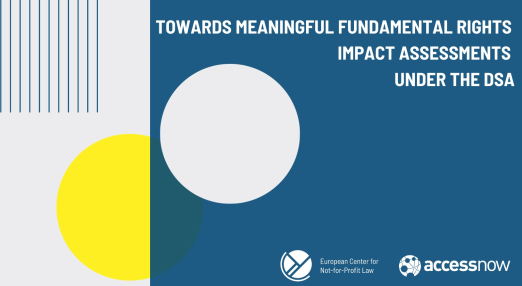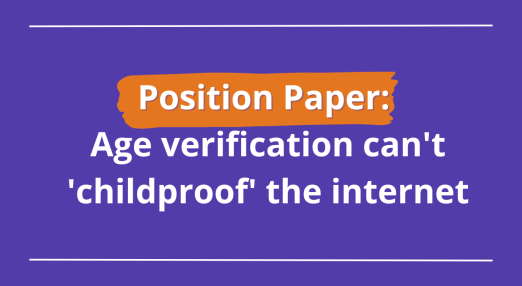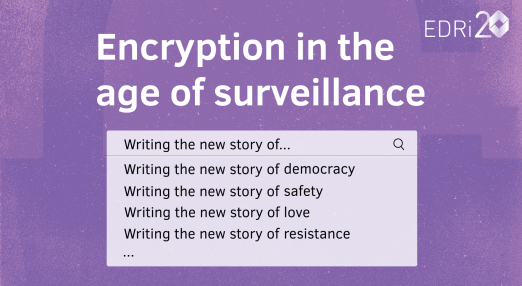Meta plans paid subscription for users who don’t want to be tracked
In a move to circumvent EU privacy law, Platform giant Meta reportedly plans to ask users to pay up to €228 a year to preserve their fundamental right to privacy on its platforms.
Filter resources
-

Meta plans paid subscription for users who don’t want to be tracked
In a move to circumvent EU privacy law, Platform giant Meta reportedly plans to ask users to pay up to €228 a year to preserve their fundamental right to privacy on its platforms.
Read more
-

EDRi-gram, 25 October 2023
We’re in high spirits after mobilising 23 activists from over 13 European countries to come to Brussels in support early October. Representing over 200,000 supporters of EDRi’s Stop Scanning Me campaign, these activists urged Members of European Parliament (MEPs) to ensure everyone’s digital security amid mass surveillance measures in the CSA Regulation. Meta is up to no good again after the European Court of Justice declared their handling of user data illegal earlier this year. In a move to circumvent EU privacy law, the tech corporation reportedly plans to ask users to pay up to €228 a year to preserve their fundamental right to privacy on its platforms.
Read more
-

Activists come to Brussels to tell MEPs to ensure everyone’s digital security amid mass surveillance measures in CSA Regulation
Between 9 and 11 October, 23 Stop Scanning Me activists from 13 European countries travelled to Brussels. They were students, parents, lawyers, young activists, human rights defenders and technologists. They came on behalf of the 200,000 people who signed the movement petition to tell their EU representatives in the European Parliament that the CSA Regulation proposal must be rejected to prevent mass surveillance.
Read more
-

Political negotiations continue: EU lawmakers fail to agree on strong rules for regulating political advertising
On 10 October, the European Parliament, the Commission and the EU Council had their fifth meeting (in the so-called trilogues) to find an agreement on the transparency and targeting of political advertising. The three institutions could not come to a consensus. Here is why.
Read more
-

EDRi-gram, 11 October 2023
The autumn leaves have started to fall but not our spirits. We organised 180 civil society groups and eminent experts to call on governments to stop the use of facial recognition surveillance by police, authorities and private companies. We also mobilised 80 media, journalists, and human and digital rights organisations to urge MEPs to ban the use of spyware against journalists & so much more!
Read more
-

The UK data bridge: a sneak peek at the UK privacy race to the bottom to come
The UK extension to the EU – US Transatlantic Data Privacy Framework will come into force on 12 October. Its adoption provides a sneak peek at the future of UK international data transfers, and the erosion of essential guarantees against surveillance measures that the UK data protection reform would bring.
Read more
-

How tech corporations like Google, Meta and Amazon should assess impacts on our rights
A new policy paper by EDRi members ECNL and Access Now outlines key recommendations on how to make fundamental rights impact assessments meaningful under the European Union's Digital Services Act (DSA).
Read more
-

Will the European Parliament walk the talk and protect journalists?
In a democratic society, where we rely on journalists to act as public watchdogs, we cannot have them worried about becoming a target of government-sanctioned spying.
Read more
-

Position Paper: Age verification can’t ‘childproof’ the internet
EDRi has published its policy paper on age verification to shed light on the risks of the widespread use of age verification and to chart out possible alternative solutions.
Read more
-

Event summary: Encryption in the age of surveillance
The EDRi-organised event on encryption, surveillance, and privacy brought together key policymakers, academics, activists and members of the press to build a better understanding of why encryption is important for people and democracy.
Read more
-

Open Letter: European Parliament must protect journalists and ban spyware in the European Media Freedom Act
As the European Parliament gets set to vote on the European Media Freedom Act (EMFA) next week, 80 civil society and journalists’ associations are calling on Members of European Parliament (MEPs) to ensure meaningful protection for journalists in the regulation by including a total ban on spyware.
Read more
-

Potential loopholes in the AI Act could allow use of intrusive tech on ‘national security’ grounds
Both the European Union (EU) and the Council of Europe (COE) negotiations are considering excluding AI systems designed, developed and used for military purposes, matters of national defence and national security from the scope of their final regulatory frameworks. If this indeed happens, we will have a huge regulatory gap regarding such systems.
Read more
